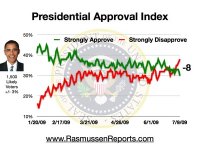Ratickle
Founding Member / Super Moderator
What do you guys think of Samuelson at the Washington Post?
Obama's Risky Debt
By Robert J. Samuelson
Monday, May 18, 2009
Just how much government debt does a president have to endorse before he's labeled "irresponsible"? Well, apparently much more than the massive amounts envisioned by President Obama. The final version of his 2010 budget, released last week, is a case study in political expediency and economic gambling.
Let's see. From 2010 to 2019, Obama projects annual deficits totaling $7.1 trillion; that's atop the $1.8 trillion deficit for 2009. By 2019, the ratio of publicly held federal debt to gross domestic product (GDP, or the economy) would reach 70 percent, up from 41 percent in 2008. That would be the highest since 1950 (80 percent). The Congressional Budget Office, using less optimistic economic forecasts, raises these estimates. The 2010-19 deficits would total $9.3 trillion; the debt-to-GDP ratio in 2019 would be 82 percent.
But wait: Even these totals may be understated. By various estimates, Obama's health plan might cost $1.2 trillion over a decade; Obama has budgeted only $635 billion. Next, the huge deficits occur despite a pronounced squeeze of defense spending. From 2008 to 2019, total federal spending would rise 75 percent, but defense spending would increase only 17 percent. Unless foreign threats recede, military spending and deficits might both grow.
Except from crabby Republicans, these astonishing numbers have received little attention -- a tribute to Obama's Zen-like capacity to discourage serious criticism. Everyone's fixated on the present economic crisis, which explains and justifies big deficits (lost revenue, anti-recession spending) for a few years. Hardly anyone notes that huge deficits continue indefinitely.
One reason Obama is so popular is that he has promised almost everyone lower taxes and higher spending. Beyond the undeserving who make more than $250,000, 95 percent of "working families" receive a tax cut. Obama would double federal spending for basic research in "key agencies." He wants to build high-speed-rail networks that would require continuous subsidy. Obama can do all this and more by borrowing.
Consider the extra debt as a proxy for political evasion. The president doesn't want to confront Americans with choices
Obama's Risky Debt
By Robert J. Samuelson
Monday, May 18, 2009
Just how much government debt does a president have to endorse before he's labeled "irresponsible"? Well, apparently much more than the massive amounts envisioned by President Obama. The final version of his 2010 budget, released last week, is a case study in political expediency and economic gambling.
Let's see. From 2010 to 2019, Obama projects annual deficits totaling $7.1 trillion; that's atop the $1.8 trillion deficit for 2009. By 2019, the ratio of publicly held federal debt to gross domestic product (GDP, or the economy) would reach 70 percent, up from 41 percent in 2008. That would be the highest since 1950 (80 percent). The Congressional Budget Office, using less optimistic economic forecasts, raises these estimates. The 2010-19 deficits would total $9.3 trillion; the debt-to-GDP ratio in 2019 would be 82 percent.
But wait: Even these totals may be understated. By various estimates, Obama's health plan might cost $1.2 trillion over a decade; Obama has budgeted only $635 billion. Next, the huge deficits occur despite a pronounced squeeze of defense spending. From 2008 to 2019, total federal spending would rise 75 percent, but defense spending would increase only 17 percent. Unless foreign threats recede, military spending and deficits might both grow.
Except from crabby Republicans, these astonishing numbers have received little attention -- a tribute to Obama's Zen-like capacity to discourage serious criticism. Everyone's fixated on the present economic crisis, which explains and justifies big deficits (lost revenue, anti-recession spending) for a few years. Hardly anyone notes that huge deficits continue indefinitely.
One reason Obama is so popular is that he has promised almost everyone lower taxes and higher spending. Beyond the undeserving who make more than $250,000, 95 percent of "working families" receive a tax cut. Obama would double federal spending for basic research in "key agencies." He wants to build high-speed-rail networks that would require continuous subsidy. Obama can do all this and more by borrowing.
Consider the extra debt as a proxy for political evasion. The president doesn't want to confront Americans with choices

